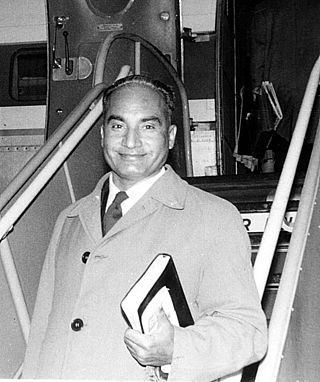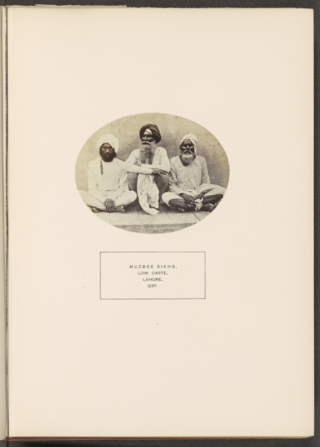Related Research Articles

Guru Amar Das, sometimes spelled as Guru Amardas, was the third of the Ten Gurus of Sikhism and became Sikh Guru on 26 March 1552 at age 73.

The Damdamī Ṭaksāl, also sometimes referred to as Giani Samparda, Jatha Bhindra(n), or Sampardai Bhindra(n) is an orthodox Khalsa Sikh cultural and educational organization, based in India. They are known for their teachings of vidya as well as gurbanisanthiya. Its headquarters are located in the town of Mehta Chowk, approximately 40 km north of the city of Amritsar. It has been described as a seminary or “moving university” of the Sikh countryside.

Sundar Singh, who was actually commonly referred to as Sadhu Sundar Sing, was an Indian Christian missionary and sadhu. He is believed to have died in the foothills of the Himalayas in 1929.

Bakht Singh Chabra also known as Brother Bakht Singh was a Christian evangelist in India and other parts of South Asia. He is often regarded as one of the most well-known Bible teachers and preachers and pioneers of the Indian Church movement and Gospel contextualization. According to Indian traditions, he is also known as 'Elijah of 21st Century' in Christendom. According to his autobiography, Bakht Singh became a Christian when he was an engineering student in Canada in 1929, even though previously he had torn up the Bible and was strongly opposed to Christianity. He was India's foremost evangelist, preacher and indigenous church planter who founded churches and established Hebron Ministries. He began a worldwide indigenous church-planting movement in India that grew to more than 10,000 local churches. Bakht Singh died on 17 September 2000, in Hyderabad, India.

Sikhism in Pakistan has an extensive heritage and history, although Sikhs form a small community in Pakistan today. Most Sikhs live in the province of Punjab, a part of the larger Punjab region where the religion originated in the Middle Ages, with some also residing in Peshawar in the Khyber-Pakhtunkhwa province. Nankana Sahib, the birthplace of Guru Nanak, the founder of Sikhism, is located in Pakistan's Punjab province. Moreover, the place where Guru Nanak died, the Gurudwara Kartarpur Sahib is also located in the same province.

Jalandhar district is a district in Doaba region of the state of Punjab, India. The district headquarters is the city of Jalandhar.
Majitha is a town and a municipal council in Amritsar district in the Indian state of Punjab. The 2011 Census of India recorded 14,503 people resident in the town.

Sodhi is a Khatri clan and Jatt clan from the Punjab region. Seven of the Sikh Gurus, from Guru Ram Das to Guru Gobind Singh were of Sodhi surname.

Mazhabi Sikh is a community from Northern India, especially Punjab region, who follow Sikhism. Mazhabi are part of wider category of Sikhs, who convert from the hindu rangrette. The word Mazhabi is derived from the Arabic term mazhab, and can be translated as the faithful. They live mainly in Indian Punjab, Rajasthan and Haryana.

The Chief Khalsa Diwan or Chief Khalsa Diwan Charitable Society is a Sikh organisation that is the central organization of various Singh Sabhas spread across Punjab, India. Unlike the Shiromani Gurudwara Prabandhak Committee, the C.K.D. is an apolitical body and only concerns itself with religious, educational and cultural issues. The organization originally controlled Sikh religious and educational concerns and was an advocate of Sikh political rights, though it presently is mostly limited to educational spheres. It was the main council of Sikhs until the birth of more radical organizations, such as the Central Sikh League, the S.G.P.C., and the Akali Dal.
Shergill is a clan (gotra) of Jats, its parent clan is Gill. According to oral history, the founding progenitor of the clan was a man named Shergill, who was the son of Gill. The Majithia family belong to this clan. The ruling house of the Nishanwalia Misl during the Sikh Confederacy was from this clan.
Sundar is an adjective signifying attractive, beautiful, good, handsome or nice. It has its origin in Sanskrit language. The word is also used as names of people by speakers of languages branching off of Indo-Aryan languages.

Aiyadurai Jesudasen Appasamy was an Indian Christian theologian, and bishop of the Church of South India in Coimbatore, Tamil Nadu. He was a member of the 'Rethinking Christianity Group', and sought to reconcile Christian with Hindu philosophies. He interpreted Christianity as 'bhaktimarga'.

Bishop Emeritus P. Surya Prakash was the fifth Bishop-in-Karimnagar Diocese of the Church of South India. from 2007 through 2014 and occupied the Cathedra in Karimnagar's Wesley Cathedral. He retired on account of superannuation in 2014 following which the Church of South India Synod headquartered in Chennai appointed a successor to him in 2015.

Kapurthala State, was a kingdom and later Princely state of the Punjab Province of India. Ruled by Ahluwalia Sikh rulers, spread across 510 square miles (1,300 km2). According to the 1901 census the state had a population of 314,341 and contained two towns and 167 villages. In 1930, Kapurthala became part of the Punjab States Agency and acceded to the Union of India in 1947.

Sardar Bahadur Sir Sundar Singh Majithia was a Punjabi landowner and politician.

The Assemblies Jehovah Shammah are an Evangelical Christian network of churches that originated in India, which is still home to the great majority of them. The Evangelical publication Operation World estimates their numbers, as of 2010, at 310,000 adults and children in 910 assemblies, as their churches are generally known. Other sources estimate upwards of two thousand congregations, with a large presence in the State of Andhra Pradesh. The movement was founded in 1942 by evangelist Bakht Singh, whose theology and ecclesiology were much influenced by the Open Brethren. Although historically distinct from the Indian Brethren movement, which originated from missionary endeavours, the Assemblies Jehovah Shammah have a lot in common with it and are sometimes considered a part of the Brethren movement worldwide.

Surjit Singh Majithia (1912-1995) was an Indian politician, diplomat and air force officer. He was elected to the Lok Sabha, the lower house of the Parliament of India from the Tarn Taran constituency of Punjab as a member of the Indian National Congress.

Punjabi Christians are adherents of Christianity who identify ethnically, linguistically, culturally, and genealogically as Punjabis. They are mainly found in the Pakistani province of Punjab, forming the largest religious minority. They are one of the four main ethnoreligious communities of the Punjab region with the others being Muslims, Sikhs and Hindus. Punjabi Christians are traditionally divided into various castes, and are largely descendants of Hindus who converted to Christianity during the British Raj in colonial India.
The Shrine of Baba Gurbaksh Das, popularly known in Punjabi as Isaaion da mazaar is a Christian shrine in Maraka in the Lahore District of Pakistan. It is a popular gathering place for Christians during festivals of the liturgical kalendar, such as Christmas and Easter; the Shrine of Baba Gurbaksh Das is a place of Christian pilgrimage. It holds the remains of Baba Mehar Das, as well as his son Baba Gurbakhsh Das; in addition Chinu Sai, Mai Derwishi and Baba Sohan Das are buried there. The shrine predates the partition of India in 1947, with the majority of the residents of Maraka being Mazhabi Sikhs prior to their conversion to Christianity. Its entrance is green in colour, with a Christian cross at the gate of the entrance. Its current caretaker is Pappu Masih.
References
- ↑ "Summer is a dangerous time for those at risk of forced marriage". The Guardian, 4 August 2011
- ↑ Brother Bakht Singh Website
- ↑ "A peak into Singapore's sitcom hero and Malaysia's too". Korean Press. 23 April 2010. Archived from the original on 23 July 2011.
- ↑ A hindu sikh sadhu (Sundar Singh) met by Jesus Christ Archived 2003-06-20 at archive.today